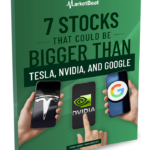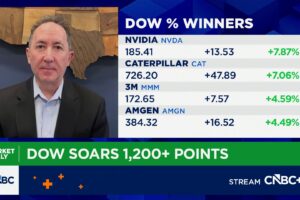Consistent growth and economic tailwinds should help this tech titan join rarified company.
There’s been a noteworthy shift over the past couple of decades that has seen technology companies ascend the ranks of the world’s most valuable companies. Twenty years ago, industrial and energy bellwethers General Electric and ExxonMobil reigned supreme when measured by market cap, valued at $319 billion and $283 billion, respectively. Now, just two decades later, some of the best-known names in technology are tops.
Leading the charge are three of the most familiar companies in the world today. All are leaders in the field of technology and need no introduction. Apple currently tops the list at $3.5 trillion, with its stock recently hitting new all-time highs. Nvidia also notched a new record high this week, moving ahead of Microsoft, as the two now boast market values of $3.4 trillion and $3 trillion, respectively.
With a market cap of $1.4 trillion, it might seem presumptuous to suggest that Meta Platforms (META -0.08%) has all the makings of a $3 trillion club member. However, the stock has been on a roll, gaining 80% over the past year and 694% over the past 10 years (as of this writing), and its winning streak appears poised to continue.
The consistent growth of the company’s social media platform, ongoing strength in digital advertising, and brilliant strategy for leveraging artificial intelligence (AI) should combine to help Meta take its place in this exclusive society.

Image source: Getty Images.
A rebound for the ages
There’s no denying that Meta Platforms suffered during the economic slump. Yet the mark of a resilient business is the ability to bounce back, and the evidence of that rebound is undeniable. In the second quarter, Meta delivered revenue that rose 22% year over year to $39 billion, fueling diluted earnings per share (EPS) that surged 73% to $5.16.
Fueling its success is the company’s reliable user growth, as those who stopped by one of Meta’s family of social media platforms — which includes Facebook, Instagram, Threads, Messenger, and WhatsApp — increased 7% year over year to 3.27 billion.
These billions of daily users form the captive audience for its digital advertising, an industry that rebounded sharply since the economic downturn. Meta is part of a duopoly in the online marketing space. Alphabet‘s Google captured an estimated 39% of the worldwide digital advertising market, with Meta taking up the second spot with 18%, according to data compiled by business intelligence platform Statista.
Its online marketing is inextricably woven into the fabric of its social media empire, helping drive Meta’s ongoing success.
Multiple ways to win
Global advertising is expected to increase by roughly 8% and reach more than $1 trillion this year, according to ad industry researcher WARC Media. Social media is forecasted to be the fastest-growing segment in digital advertising, growing to 22% of total ad spending, according to the data. Meta figures prominently in the report, which says Meta is “on course to record oversized gains in the coming months.” As one of the biggest players in the adtech industry, Meta will benefit from the ongoing rebound.
Advertising aside, Meta has made a number of strategically important moves to profit from the accelerating adoption of artificial intelligence (AI). With billions of daily social media visitors, the company mined its vast treasure trove of data to create a suite of top-tier language models, which form the foundation for generative AI.
The fruit of those labors is LLaMA (Large Language Model Meta AI), the AI system that fuels its Meta AI chatbot. The latest version — LLaMA 3 — is “one of the world’s leading AI assistants,” according to the company. By making LLaMA open source, Meta is hoping to boost adoption, which will lead to even more data to leverage. While Meta AI is free to individual users, the company charges enterprises and cloud infrastructure providers, which peddle it on their cloud platforms.
While AI makes all the headlines, there are other potential ways for Meta to win. The company has invested heavily in Meta’s Reality Labs, which housed its Oculus virtual reality (VR) business, Quest VR headsets, and its ambitions for the metaverse. While these are little more than sidelines at this point, CEO Mark Zuckerberg believes these will be key to Meta’s future growth and, eventually, its bottom line.
With the trifecta of a recovery in digital advertising, the opportunity represented by generative AI, and its other initiatives, it isn’t hard to envision a path for Meta Platforms to make its way into the $3 trillion club.
The path to $3 trillion
Meta has a market cap of roughly $1.46 trillion (as of market close on Oct. 17), so it will take stock price gains of roughly 105% to increase its value to $3 trillion. According to Wall Street, Meta is expected to generate revenue of $161.9 billion in 2024, giving the stock a forward price-to-sales (P/S) ratio of 9. Assuming its P/S remains constant, Meta would need revenue of roughly $332 billion annually to support a $3 trillion market cap.
Wall Street is currently forecasting growth of nearly 14% annually over the coming five years for Meta. If the company achieves that target, it could achieve a $3 trillion market cap as soon as 2030. It’s worth noting that Meta has grown its annual revenue by more than 900% over the past decade, so those estimates could well be conservative.
Furthermore, at 29 times earnings, Meta is selling for a discount compared to a multiple of 30 for the S&P 500 — yet boasts stock price gains of 694% over the past 10 years, far exceeding the 214% increase for the S&P 500. That helps illustrate why Meta Platforms is worth every penny, particularly as it pursues multiple paths to success.
Suzanne Frey, an executive at Alphabet, is a member of The Motley Fool’s board of directors. Randi Zuckerberg, a former director of market development and spokeswoman for Facebook and sister to Meta Platforms CEO Mark Zuckerberg, is a member of The Motley Fool’s board of directors. Danny Vena has positions in Alphabet, Apple, Meta Platforms, Microsoft, and Nvidia. The Motley Fool has positions in and recommends Alphabet, Apple, Meta Platforms, Microsoft, and Nvidia. The Motley Fool recommends the following options: long January 2026 $395 calls on Microsoft and short January 2026 $405 calls on Microsoft. The Motley Fool has a disclosure policy.








